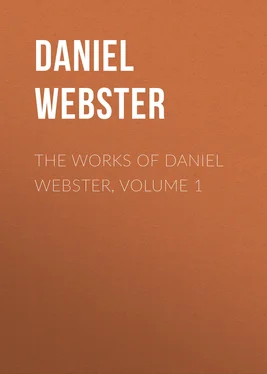Reminiscences of Congress.
Chancellor Kent’s remarks are given entire in the introduction to Mr. Webster’s Speech at the New York Dinner, Vol. I. p. 194.
Mr. Geo. P. A. Healey.
North American Review, Vol. XXXI. p. 537.
This passage does not appear in the report preserved in the volume containing his Select Speeches.
It is not wholly unworthy of remark in this place, as illustrating the dependence on Mr. Webster’s aid which was felt at the White House, that, on the day of his reply to Mr. Calhoun, the President’s carriage was sent to Mr. Webster’s lodgings, as was supposed with a message borne by the President’s private secretary. Happening to be still at the door when Mr. Webster was about to go to the Capitol, it conveyed him to the Senate-chamber.
March’s Reminiscences of Congress, pp. 291, 292.
Not long after the publication of this speech, the present Lord Overstone, then Mr. S. Jones Lloyd, one of the highest authorities upon financial subjects in England, was examined upon the subject of banks and currency before a committee of the House of Commons. He produced a copy of the speech of Mr. Webster before the committee, and pronounced it one of the ablest and most satisfactory discussions of these subjects which he had seen. In writing afterwards to Mr. Webster, he spoke of him as a master who had instructed him on these subjects.
This chapter is republished, with but slight modifications, from the volume of Mr. Webster’s Diplomatic and Official Papers which appeared in 1848, to which it served as the Introduction.
Mr. Stevenson.
Senate Papers, Twenty-seventh Congress, First Session, No. 33.
Younger son of Mr. Webster, who died in Mexico, in 1848, being a major in the regiment of Massachusetts Volunteers.
The authorities are given in Story’s Commentaries Vol. III. pp. 675, 676; Conflict of Laws, pp. 520, 522; and in Kent’s Commentaries, Vol. I. pp. 36, 37.
The following passage from a letter of Robert Walsh, Esq., to the editors of the National Intelligencer, dated Paris, 28th October, 1842, furnishes confirmation of the remark in the text:—
“The former journal [The Times], of the 18th instant, acknowledges that Mr. Webster ‘has not exaggerated the hardships and evils which the practice of impressment occasioned in the last war.’ It ratifies his ideas of the probable aggravation of them, if the practice should be ever renewed; it would even dispense with press-warrants at home, as adverse to the general principles of British liberty and law: it advises some general measure for the entire abolition of arbitrary impressment both at home and abroad, and it expresses its belief of a very strong probability, that, in the event of a war, no instructions for the impressment of British seamen found in American merchant-vessels will be issued to her Majesty’s cruisers. The Standard chimes with the great oracle, and concludes in this strain: ‘We may infer that, whatever may be the plan hereafter for managing our navy, impressment will never again be resorted to; this is beyond a doubt: the practice complained of by Mr. Webster will be abandoned .’”
Mr. Cushing.












